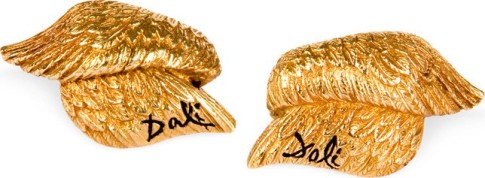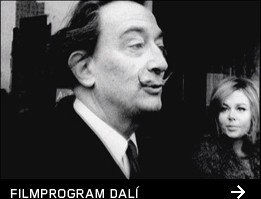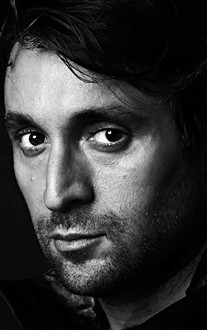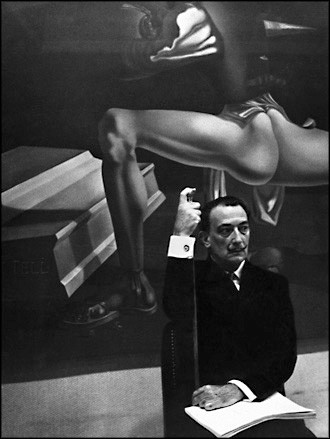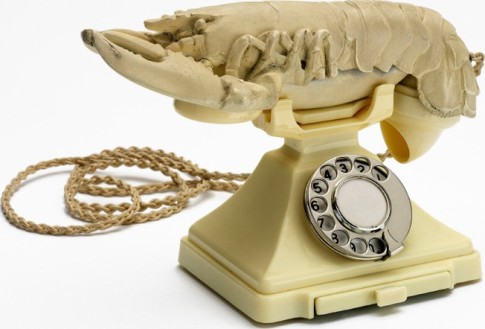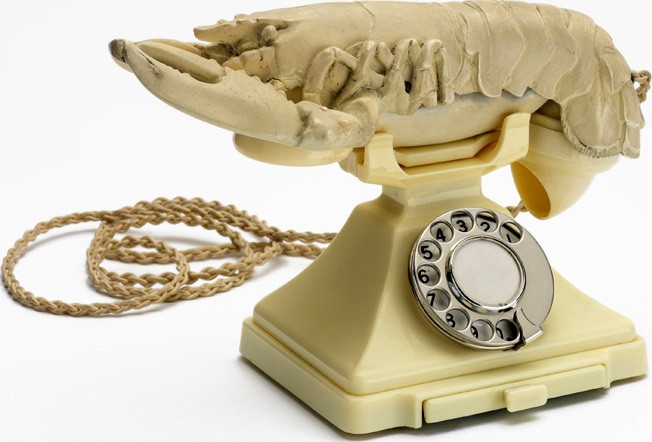
Salvador Dalí, Vit afrodisisk telefon, 1936 © Salvador Dalí, Gala-Salvador Dalí Foundation/BUS, Stockholm 2009
Re-thinking Surrealism: Shock, Disturb and Surprise
Shock, Disturb and Surprise
Plats: Moderna Museet i Stockholm, auditoriet
Tid: 21-22 november kl 11–16
Språk: engelska, spanska (simultantolkning)
Föreläsare från England, Spanien, Frankrike, Italien och USA kommer att belysa ny forskning kring Salvador Dalí och surrealism. Genom att diskutera några av de teoretiska tankarna bakom utställningen Dalí Dalí med Francesco Vezzoli analyseras Dalís influens på samtida konstnärer som Francesco Vezzoli. Välkomna till två dagar med föreläsningar varvade med presentationer av bl a unikt dokumentärt filmmaterial.
Symposiet riktar sig till forskare inom de berörda fälten och till en intresserad allmänhet.
Läs hela programmet! (pdf)
Dalí Dalí med Francesco Vezzoli
Biljetter
200 kr (MMV 100 kr)
Förfriskningar och inträde till utställningen ingår.
Biljetter säljs via www.ticnet.se Resterande biljetter säljs på Moderna Museet 21 november från kl 10.
Kontakt
Medverkande
Dawn Ades, University of Essex, en av ledarna för The Centre for the Study of Surrealism and its Legacies
David Lomas, professor i konsthistoria vid University of Manchester och en av ledarna för The Centre for the Study of Surrealism and its Legacies
Pilar Parcerisas, Barcelona, doktor i konsthistoria, konstkritiker och curator
Frédérique Joseph Lowery, doktor i fransk litteratur och frilansande curator
William Jeffett, curator, Salvador Dalí Museum, St. Petersburg, Florida
Francesco Vezzoli, konstnär
Lars Nittve, överintendent Moderna Museet
Ulf Eriksson, intendent Moderna Museet
Nicholas Descharnes, Paris, driver Archives Descharnes
Programme 21 November
11.00
Welcome, Lars Nittve, Director, Moderna Museet
11.10
Introduction, Karin Malmquist, Moderna Museet
11.20
The Architectonic Angelus of Millet. Dawn Ades, Professor of Art History, Co-Director of the Centre for the Study of Surrealism and its Legacies. Salvador Dalí applied his paranoiac-critical method to Jean-François Millet’s painting Angelus (1857-59), a painting that had fascinated and inspired him since the 1930s. Dawn Ades analyses Dalí’s lifelong relationship to the painting and how it is one of many examples of how Dalí reverts to, and processes, a subject several times.
11.50
Divine Dalí. David Lomas, Professor of Art History, University of Manchester, Co-Director of the Centre for the Study of Surrealism and its Legacies. The talk considers how Dalí remakes his artistic identity on the model of a screen celebrity during the 1930s and 1940s, not coincidentally a period of his close involvement with Hollywood. Dalí’s adoption of narcissus as a personal myth is a consequence of his immersion in this world. The term “divine”, David Lomas shows, points contradictorily to Dali’s obsession with Leonardo da Vinci at the same time that it evokes a contemporary, cinema-derived idea of fame. Divine Dali is a prescient harbinger of later artists like Warhol and Vezzoli who explore what it means to be an artist in an age of celebrity.
12.35
Lunch
14.00
Mae West done wrong by Vezzo[da]li. Frédérique Joseph Lowery, Ph.D. art critic and exhibition curator. By using Mae West’s face as a surrealist apartment, Salvador Dalí opened up a space for the display of his own art. “Come up and see me some time”, Mae West famously said in She done him wrong. Dali indeed modified the poster of this movie to touch up the face of the Broadway star. Vezzoli responded to this logic by also using Dalí’s “face” in order to display his own embroidered/painted works. He drew upon the medium of cinema instead of theatre. Frédérique Joseph Lowery explores Vezzo[da]li’s “interface”, She also examines how Dali’s collaboration with major choreographers, who allowed him to present his works on international theatre stages, built the conceptual foundations of his Theatre-Museum.
14.45
Break
15.15 – 16.00
L’Histoire prodigieuse de la Dentellière et du Rhinocéros. Nicolas Descharnes, runs Archives Descharnes, in Paris. His father, Robert Descharnes, was a photographer and a close friend of Salvador Dalí. The two men worked together on the unfinished film L’Histoire prodigieuse de la Dentellière et du Rhinocéros, (The Prodigious Adventure of the Lacemaker and the Rhinoceros). Nicolas Descharnes talks about the film project and presents exclusive raw material from the film.
Programme 22 November
11.00
Introduction, Karin Malmquist, Moderna Museet
11.10
Dalì and Politics (1951-1974) William Jeffett, Chief Curator, Exhibitions at the Salvador Dalí Museum in St. Petersburg, Florida, address how Dalí projected himself as a public figure within the landscape of post-war politics. In part he situated himself, in relation to Picasso’s identification with communism, as an anti-communist, identifying his public image within the US perspective of the cold war. In the 1940s, Dalí famously painted Franco’s ambassador to the US. Shortly thereafter Dalí sought a rapprochement with Franco’s Spain constructing himself as the consummate Spanish artist. Dalí’s contrarian position persisted well beyond the onset of the cold war. As late as the early 1970s, and at a time when arguably there was no opportunistic advantage, he continued the reaffirmation reactionary positions.
11.55
Short break
12.15
Salvador Dalí and Marcel Duchamp. Elective Affinities. The 20th Century Painting Machine. Pilar Parcerisas, PhD in Art History. art critic and curator. The friendship between Salvador Dalí and Marcel Duchamp played a major role in the evolution of 20th century painting. Both had ideas about a new pictorial conception based on the research of a new representational system. Marcel Duchamp achieved this through the creation of his erotic “machines célibataires”, like The Large Glass (1914-1923), while Salvador Dalí conceived the paranoiac-critical method. Their attitudes were derived from the literature of the late 19th century and taken to the world of the pictorial space. Pilar Parcerisas talks about the still not fully explored relationship between Salvador Dalí and Marcel Duchamp, not only regarding their personal friendship, but also from an aesthetical approach.
13.00
Lunch
14.15
Conversation between Francesco Vezzoli, artist, and John Peter Nilsson, Moderna Museet, curator Dalí Dalí featuring Francisco Vezzoli.
14.45 – 16.00
Panel discussion with all the speakers. Moderator: Dawn Ades.
Moderna Museet i samarbete med The Centre for the Study of Surrealism and its Legacies, University of Manchester, Instituto Cervantes, Stockholms universitet och Södertörns högskola.
Med stöd från Stiftelsen Riksbankens Jubileumsfond.

